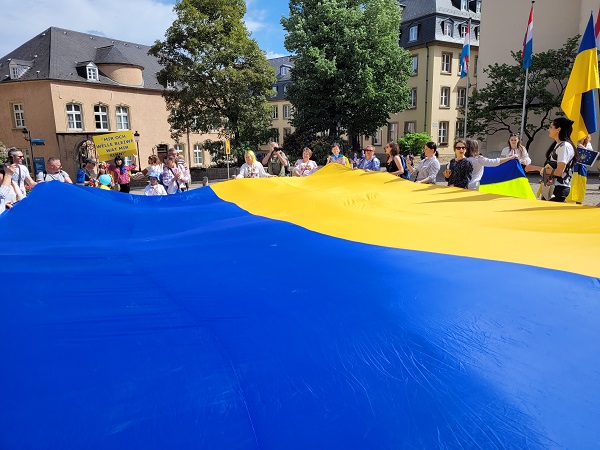 Anti-war protest in Luxembourg City on 21 May 2022;
Credit: Jazmin Campbell / Chronicle.lu
Anti-war protest in Luxembourg City on 21 May 2022;
Credit: Jazmin Campbell / Chronicle.lu
As someone who has spent a significant part of her early adulthood studying languages and linguistics and history, I like to think I know a bit about the importance of language. I will admit that I am no expert in the Ukrainian or Russian languages, but I am aware of the debate surrounding the use of Russian-language based transliterations of Ukrainian cities – a particularly sensitive topic following Russia's full-scale invasion of Ukraine which began on 24 February 2022.
What's in a name?
Recently, the City of Luxembourg (Ville de Luxembourg – VdL) announced its decision to name a new national road linking Howald in Hesperange to Luxembourg-Gare after the Ukrainian capital. However, this gesture of solidarity caused an uproar due to the proposed use of the spelling "Kiev" (full name: "Boulevard de Kiev"), derived from the Russian "Киев", instead of "Kyiv", from the Ukrainian "Київ". Whilst the City of Luxembourg initially defended its decision, assuring that it meant only to use the official French name ("Kiev"), several members of the public, particularly the Ukrainian community, urged the city council to reconsider and only use the Ukrainian version. Some felt that the use of the Russian transliteration, regardless of the fact that it is the official name in French, would be a small victory for Russia and thus would not reflect a true act of solidarity with Ukraine. Ultimately, in recognition of these concerns, the City of Luxembourg decided to name the road "Boulevard de Kyiv" – a decision welcomed by those who had opposed the initial proposal.
Whilst many sympathised with the Ukrainian community on this matter, others either simply did not understand why this was such a big deal or insisted that the French name be used, as it is for nearly all street signs across the Grand Duchy. This brings us to the fundamental question of why language matters.
Four years after Ukraine’s declaration of independence from the Soviet Union in 1991, the Ukrainian government adopted "Kyiv" as the official romanised name of the country’s capital; the government also promotes the Ukrainian spelling of other cities in Ukraine, such as Kharkiv (Russian: Kharkov), Lviv (Russian: Lvov) and Odesa (Russian: Odessa), as part of the "CorrectUA" campaign. However, the Russian version "Kiev" continued to be most widely used in the international media for several years, not least due to historic Russification efforts. The question of what name to use for the Ukrainian capital became increasingly sensitive and politically charged following Russia's annexation of Crimea in 2014, and again following Russia's full-scale invasion of Ukraine in 2022.
#KyivNotKiev
In 2018, Ukraine’s Ministry of Foreign Affairs launched the social media campaign #KyivNotKiev to encourage international (mainly English-language) media outlets to use the official Ukrainian spelling. The campaign forms part of the country’s efforts to distinguish itself from its Soviet past. In June 2019, the United States (US) Board on Geographic Names officially recognised "Kyiv" as the correct name for the Ukrainian capital. Many if not most English-language media outlets (and international airports) have opted for this spelling in recent years as well.
Among French-language media, the jury is still out on whether to use the Russian (and official French) version "Kiev" or the Ukrainian transliteration "Kyiv"; most continue to use the former, although the Russian invasion has certainly ignited a debate on the subject. Similarly, most German-language media continue to use the spelling "Kiew" (derived from the Russian language), which remains the official name in German. As for the European institutions, which communicate in the 24 official languages of the European Union (EU), "Kyiv" appears to be the preferred spelling in English-language publications whilst "Kiev" and "Kiew" are favoured in French- and German-language publications, respectively.
With this subject being so important to the Ukrainian people, and many in the EU and around the world wishing to show their solidarity with Ukraine at present, will the official French and German names (and perhaps other languages) be changed soon? And will French- and German-language media, and other institutions, eventually adopt the Ukrainian transliteration regardless of what is written in their dictionaries? I wouldn't rule it out. After all, human language has been constantly evolving for more than 50,000 years! On the other hand, the spellings "Pékin" and "Peking" are still widely used in the French and German languages, respectively, to refer to the Chinese capital, although it is usually spelled "Beijing" in the English language today. Nevertheless, if we (the international community) wish to show solidarity with a group of people, i.e. Ukrainians, surely the least we can do is spell their capital correctly?
Language and identity
For further examples of the importance of language and even street names, one need look no further than Luxembourg – a small country that knows all too well what it is to be part of various European empires (as well as the importance of preserving and promoting its own language). During the Second World War, Germany once again invaded its neutral neighbour (the second of two such invasions in the 20th century, the first having taken place during WWI) and subjected Luxembourg's streets to a German renaming campaign. Shortly after its liberation in 1944, the Grand Duchy reverted to its predominantly French street names. In recent years, the Luxembourgish names have been added to several street signs as well. This all ties in with the country’s national motto: “Mir wëlle bleiwe wat mir sinn” (we want to stay what we are) – a motto to which many Ukrainians can relate today.
Another long-disputed example can be found in my home country: Northern Ireland (or as some refer to it, "the north of Ireland" – again, language matters). Whilst the official name of Northern Ireland's second largest city is "Londonderry" (located in the homonymous county), some people (including many of its inhabitants) reject this name due to its historic links with the Plantation of Ulster (British colonisation of the Irish province of Ulster in the 17th century), favouring the name "Derry" (the traditional anglicised form of the Irish-language name "Doire"). The Troubles (also known as the Northern Ireland conflict) brought this naming debate to the fore: the name "Derry" had become associated with the Irish nationalist community whilst "Londonderry" was the generally preferred name among British unionists. This debate continues even today, although we have thankfully moved away (mostly) from the violence that cast a dark shadow on Northern Irish society for three decades.
The point remains that language is important, particularly in terms of one's identity, and the Ukrainian people have made it clear that their capital is #KyivNotKiev. The City of Luxembourg has recognised this and taken action in its efforts to show solidarity with Ukraine and, with the amount of media attention attracted by the ongoing war, perhaps we will see a shift elsewhere too.









